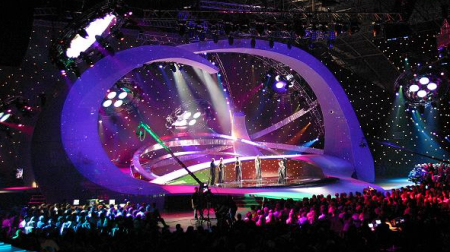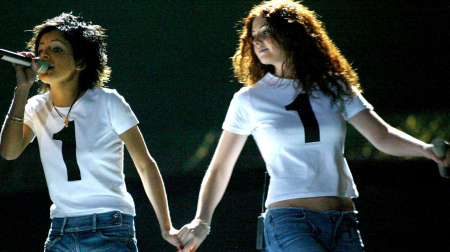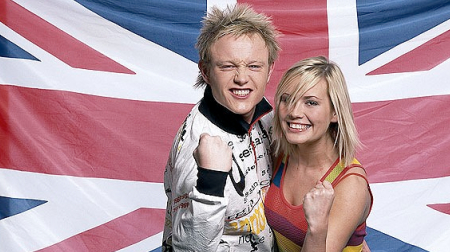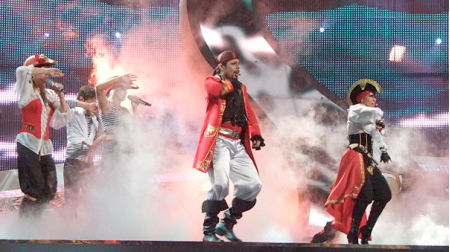That really does make me feel old! It feels like only yesterday that I was excited at the prospect of jetting off to Riga for Eurovision 2003! Let’s take a trip down memory lane and reflect on Riga, ten years on.
2002 was of course a watershed moment in the history of The Eurovision Song Contest given that it took place in the territory of the former Soviet Union for the first time. However 2003 also serves as a landmark Contest due to level of controversy that the event engendered as well as the fact that it represents the last ‘old school contest’.
Like Estonia, Latvia took the opportunity to stage Eurovision very seriously; it was an avenue for promoting the country, particularly in the run-up to EU accession. To quote the Baltic Times, “staging Eurovision might not seem like a bit deal to some people but it Latvia it is considered a privilege to host such a well-known and widely watched international event”.
Again, similar to the Estonians the previous year, Latvians were overwhelmingly supportive of the Song Contest. Even the President of Latvia attended the 2003 Contest, commenting that “Eurovision for Latvia means being at the centre of attention of millions of TV viewers in Europe and even beyond and, of course, the element of recognition of a country, of its name being mentioned, it a great benefit, and certainly to a small country like Latvia”. It goes to show that at this point, nearly fifty years after the inaugural Contest, the event still has significance in terms of international prestige.
What Did It Take To Put On Latvia 2003?
The 2003 Contest was a slick production, however the road to Riga was not smooth. In the summer of 2002 state broadcaster LTV publicly declared that they had “limited funds” with which to produce the show. Inevitably this led to the government stepping in and contributing some €2.3 million since failure to host the show would undoubtedly damaged Latvia’s reputation, projecting an image of the country as a “poor former Soviet republic” as opposed to “prospective” EU member.
By March 2003 it was reported the preparations for the event had run behind schedule. Whilst this was never confirmed (as if they would ever admit this anyway) the EBU Supervisor of the contest that year, Sarah Yuen, admitted that a lot of pressure was placed on the Latvian broadcaster to “get things straightened out” (no pun intended).

And then this happened
Some of the postcards consisted of rehearsal shots filmed during the week of the Contest, which adds to the notion that preparations for the 2003 contest were a scramble to the finish line. What is interesting here is the expectations concerning the Eurovision postcards appear to have changed dramatically by this point. In the 1990s many of the postcards were either partly or completely filmed with the artists during the rehearsals. However, these issues seem minuscule compared to what would actually happen during Eurovision week itself.
The Politics Of Song
Politics is never far from Eurovision and in 2003 it reared its ugly head once more. The Latvian government had previously passed a series of education reforms which were due to take effect in September 2004. Under the new law, Latvia’s Russian language schools had to teach most of their classes in Latvian, the only official state language. Despite assurances that this was not a slur or an attack on the sizeable Russian speaking minority in the country, many took to the streets in protest viewing these reforms as discrimination. One of the more sizeable protests took place in Riga the day before the Eurovision Song Contest when thousands of journalists from around Europe were present. Whilst the reforms were passed the contest afforded the protestors a stage to communicate their message.
Another message which was quite literally loud and clear was the displeasure with which the Russian entry that year, t.A.T.u, was greeted in Riga. On the Friday evening dress rehearsal one half of the infamous duo, Yulia Volkova, did not appear on stage and according to the announcement she was ill. This left Lena Katina to stand alone and face what almost felt like a baying mob.

t.A.T.u. are up to something (are the press watching?)
Will They, Won’t They?
T.A.T.u played the great game with the Press like no other Eurovision entrant had done before. In their press conference the two girls dodged questions, spoke only in Russian before declaring that “everything is awful” and that they were going back to the hotel room that they were sharing to have sex in the very small bed. What they lacked in vocal ability they made up for in publicity!
There was also the somewhat tiresome question about whether the duo would do anything “outrageous” during their performance in the Final. And by outrageous everyone was worrying that they might… kiss. Looking back now this “controversy” over a lesbian kiss appears to be nothing more than a storm in a teacup, which perhaps can be taken as a positive sign of how Europe has changed in the last decade.
Having personally been in the hall for the Final and hearing the booing for the Russian entry, I’m almost certain that the microphone levels were altered since the television performance does not convey the contempt in which some audience members held them. Was it because the Russians had taken up most of the Contest publicity? Was it due to the education reform protests? Was it due to the fact that it was simply the Russian entry? Or was it just a bit of panto? (Oh no it wasn’t! – Ewan)
It’s All About The Music
For me personally 2003 stands out due to the quality of the songs, I think it was one of the strongest years musically with many different styles. Of course from a British perspective this contest will always be synonymous with the dreaded ‘nul points’ thanks to Jemini’s lackluster performance. Not a sort of post-Iraq backlash as BBC commentator Terry Wogan stated, on the way home Wogan conceded that they were simply out of tune.
2003 also stands out because of the exciting and unpredictable voting. We’ve not had a contest like it and, in my opinion, it is something which is much-needed in Malmo. The Eurovision Song Contest voting procedure used to be the highlight of the show and now with the recent runaway winners, predictable voting patterns, and a focus only on the 8, 10, and 12 points, it is fast becoming the show’s nadir.

Jemini would never be this happy again
And Then It All Changed
The 2003 Eurovision Song Contest is the last time that the show took place over one evening. Turkey’s victory in the contest that year ushered in a new era in the contest, with which the fortunes of both Greece and Turkey in Eurovision changed dramatically. It is surely no coincidence that the Greeks considerably upped their game in Eurovision following this and scored their first victory in 2005.
Greece and Turkey had previously been seen as ‘no-hopers’ throughout the Eighties and Nineties… yet from 2003 onwards they went on to dominate the contest. It is interesting too that Cyprus awarded Turkey points for the first time in 2003. This was accompanied by the spokesperson declaring “Europe, peace to Cyprus, Turkey eight points”. It is interesting to note that this occurred at the time when both sides of the divided island were moving closer together as a result of on-going peace talks, even though the Contest is about song, not politics.

The Pirates of Riga
Eurovision of course changed dramatically in 2004 with the introduction of the live semi finals and significant increase in the number of participants. The contest has continued to break new ground in Europe, explore new rules and presentations, and as we saw in 2012, uncover new controversies. Riga’s moment in the spotlight, just as every host city and country know, was a unique moment in a rich tapestry of an ever-changing Contest.









Fine article as always. 2003 is one of the great song contests in terms of great songs presented, good atmosphere and a good close contest Turkey and Belgium, countries normally seen at the other end of the ESC spectrum.
I have a query though – I thought the postcards were filmed outdoors somewhere, eg as Sweden and Slovenia’s postcard were presented on the night, but the EBU actually rejected them as poor quality and they had to do a re-shoot. I wonder if anyone else remembers this or am I making things up?
I remember this but when doing research couldn’t find much on this. Certainly they were filmed at the 11th hour and compared to Tallinn the year before they seem very rushed and it was certainly a missed opportunity to promote Latvia really.
Great read and very good article!
Just a note…What´s politics about Cyprus giving Turkey 8 points?Turkey was the winner and the song became one of the biggest hits in 2003 in Cyprus…Politics is the two of them not giving points to each other before that,not when they actually do,especially since Turkey won at the end
An imaginative, fun and exciting contest. It is certainly light years ahead of the amateurish production , cheap-looking sets, and cringeworthy presenters of the previous two years.
2003 was one of the first contests I remember watching, I liked it then, and looking back it was one of the more outstanding contests.
I agree about the quality of the songs…but not so much about the production itself. There are a LOT of miscued camera shots.
Perhaps none more than with Sertab: if you watch her performance you can see she’s getting frustrated when the wrong camera is on. It happens at least 4 times in 3 minutes: had they got the shots right I don’t think it would have been nearly as close as it was. Even with her performing 4th.
It’s one of the best eurovision song contest! I remember all singers and of course STAGE. It’s the best eurovision stage ever! first video screen on the floor!